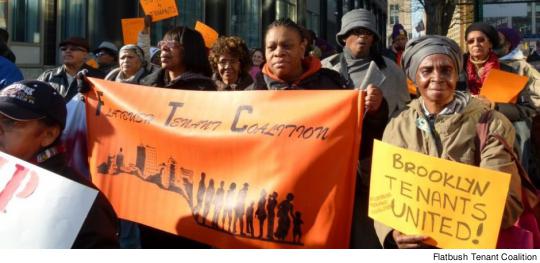 |
Since the last PSC contract was signed in 2009, rents in New York City went up astronomically while our pay scale has remained flat. According to a recent report in the Wall Street Journal, the average rent in NYC outside of Staten Island costs more than 30% of the top salary of a full professor at CUNY. However, rent regulations are still in place that limit rent increases for current tenants.
If the real estate lobby is successful in its push to weaken the city’s rent laws even further, any wage increases we may secure at the bargaining table could simply end up in the pockets of our landlords. This June the New York State Legislature will decide whether to renew the laws that regulate rents in New York City. Tenant advocates are working hard to ensure that the rent protections are both renewed and strengthened.
Rent Deregulation
Rent laws limit the increases that landlords are permitted to seek when leases are renewed. They also protect tenants who comply with the terms of their leases from evictions. While enforcement has been weak, the rent laws are important to the economic stability of all working people in NYC.
In the 1990s, real estate interests were able to weaken the rent regulations and secured a change that automatically deregulated apartments when the rent exceeds $2,500 a month. As the real estate market overheated, many buildings were deregulated as rents were legally raised above this limit. In addition, speculators bought occupied buildings and used a host of methods, both legal and illegal, to force tenants out and either sell apartments as condominiums or rent them for more than $2,500. More and more apartments are deregulated every year; it is a formula for the eventual elimination of rent regulation altogether.
Led by two tenant organizations, Tenants & Neighbors and the Metropolitan Council on Housing, the campaign for renewal of the rent laws is pressing for the passage of nine bills in Albany. The most important bill seeks to repeal vacancy deregulation and re-regulate apartments that have been deregulated in the last 20 years. Others would close a host of loopholes that have allowed landlords to price tenants out of their apartments and tack on illegal fees that effectively serve as rent increases.
A parallel struggle in Albany is over whether to renew a huge tax benefit for large developers (421-a). Many housing advocates are calling for termination of the program, which cost the State more than $1 billion in foregone tax revenue last year. The tax break has subsidized construction of luxury apartments – for example, the One57 tower near Central Park, where a penthouse unit sold for $100 million, slashed its property tax bill by 95% thanks to 421-a. Housing advocates say that money could be better used as public expenditures for affordable housing. “Subsidize our house, not the penthouse!” protesters chanted in a recent demonstration at One57.
Changing Rent Policy
In Albany this year, leading tenant advocacy groups are pushing for a two-year renewal of the rent laws in the hopes that the political landscape will be more favorable for even greater reforms down the road. One of those fundamental changes is repeal of the Urstadt Law, which places responsibility for rent regulation with the State legislature, which is dominated by landlord interests, rather than letting cities decide rent policy for themselves.
On May 19, rent-law activists are planning a day of grassroots lobbying and action in Albany; free buses will be leaving from New York City. There will also be a rally on May 14 in Foley Square in NYC.
______________________________
Tom Angotti is professor of urban affairs and planning at Hunter College and the Graduate Center, and chair of Hunter’s PSC chapter.

